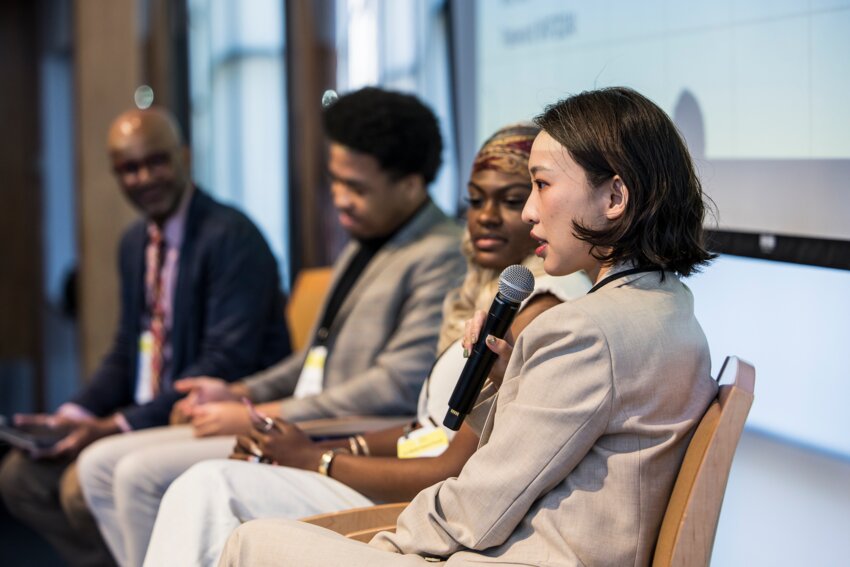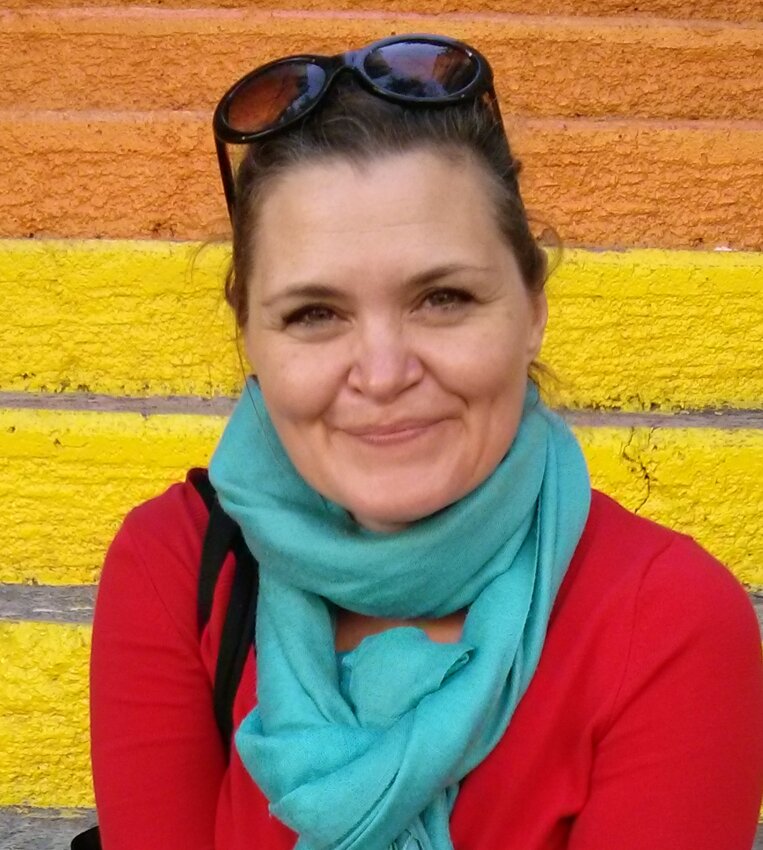“It’s been an incredible year,” said Jin Ding.
Ding had an eventful day the day before talking with E&P. The 35-year-old CEO of Initium Media had attended her naturalization ceremony, and she officially became an American citizen. “This will be the first time I’m able to vote in my whole life,” said Ding from her home in Washington, D.C.
Having moved to the U.S. at 22 as a young reporter, Ding spent the past 13 years wending her way through some of the country’s most prestigious journalism institutions.
Ding got her undergraduate degree in journalism at Tianjin University of Sports in mainland China and worked as a sports journalist until she left in 2011 to go to London to be a correspondent covering the Olympics. She then made her way to the U.S., working briefly for NBC, then moved on to the Pulitzer Center for Crisis Reporting, eventually climbing the ranks to management and leadership roles at The Associated Press and the Center for Public Integrity.
But in November 2023, Ding took a leap she hadn’t thought was in her future. She accepted a job as the chief executive officer for Initium Media. This Chinese-language digital news site had been based in Hong Kong, but it wanted to expand its reach and serve the growing number of Millennial and GenZ Chinese who have made their way to the U.S. over the past decade.
The time is now

“I honestly felt an urgency to do this. There’s been such a loss of journalism in China and Hong Kong over the last five to seven years,” explained Ding. She observed that over the last decade, China’s economic and political situation has diminished newsrooms and journalism training from when she was young. And she sees a chance to make a difference.
“Over the last decade, I slowly became the only Chinese national who had climbed up to the executive ranks in the U.S. media. I’ve learned so much doing this work. So, it’s important to me to step up,” she said.
Initium moved its headquarters from Hong Kong to Singapore, a year before Ding's arrival. She explained that the political climate in Hong Kong had become unsafe for their reporting team, which has won dozens of awards for exposing corruption accountability reporting and reporting on stories about the political intimidation of democracy advocates.
Despite the move to Singapore, Initium still reports on Hong Kong and mainland China with a network of trusted freelancers. Initium’s staff are mostly editors, working with freelance reporters, and they are spread around the globe. The newsroom’s editor-in-chief, Lulu Hui Ning, is based in Europe, while Ding and Senior Editor Allison Jing Yang are based in Washington, D.C.
The safety concerns are so severe that the newsroom has implemented a policy where, in some cases, bylines do not use the reporters’ actual names. Ding acknowledges that many U.S. journalists might have concerns about this policy. However, she emphasizes that Initium’s newsroom maintains a high level of transparency with its audience about when and why reporter identities and locations are protected.
“Trust is built with our reporting. We are an independent newsroom in a place where there are hardly any others, and our audience knows this by what we are willing and able to report,” she said.
Initium’s reporting earned 12 nominations for the 2024 Society of Publishers in Asia (SOPA) Awards for its coverage of Taiwan’s MeToo scandals and China’s COVID-19 lockdowns, among others. The team’s investigative reporting on China’s COVID response also earned a Human Rights Watch award this year, and they earned an Honorable Mention for a report on challenges faced by the LGBT community in Hong Kong.
Cross-cultural learning

Initium is a for-profit newsroom. While it provides some of its reporting and lifestyle content for free, its deeper reporting projects are behind a paywall. They have a two-tier paywall system: one that gives access to Initium’s in-depth reports and a second that is bundled with access to The Wall Street Journal.
Coming in as the “American” has been a unique experience for Ding, who took on writing the newsletter when she started to improve her Chinese writing after years of working exclusively in English.
Ding said she brought things into Initium from U.S. news culture, including some rules, guidelines and standards. “There is no word or concept in Chinese for ‘audience engagement,’ and bringing that idea to the table has been important as we think about how we can better serve our readers’ needs,” she explained.
On the other hand, she said there are revenue generation methods Asian media organizations use that were new territory for her and that she thinks could help U.S. newsrooms as they struggle to find diverse revenue streams, including sponsorships.
Ding said that while her background in the U.S. mainly involved working for nonprofit news organizations, she finds a sense of freedom in working in a for-profit environment. “We get to take more risks. We experiment more than I did in other newsrooms,” she said. When you have funders demanding high results, the stakes often feel too high to take a chance on an idea. And I’m loving this level of experimentation that we are able to do.”
The opportunity
The largest markets for Initium are China, Hong Kong and Taiwan. The fourth largest market for the Chinese-language publication is the United States. That’s where the team seeks to meet what they believe is a growing unmet need.
“So many people from China and Hong Kong have moved to the U.S. in the last decade. They are a younger generation, and they get their news and lifestyle reporting on digital platforms,” explained Ding. “And while some of them are highly educated and speak English, the information they want about their home country and the Chinese community in the U.S. are not being served by older Chinese language news organizations or English language media.”
An E&P review of the recent report and database, the Asian Media Initiative, from CUNY’s Graduate School of Journalism, indicates 156 U.S. news outlets serve Chinese-speaking people. Some are television and radio, many newspapers and only a handful are digital-first outlets.
Ding and the team at Initium see an opportunity to grow their U.S. audience. To do this, their executive editor, Lulu Hui Ning, is leading an effort to survey the Chinese-speaking community to better understand their interests and news needs. Ding said they won’t necessarily be looking to do hyperlocal news. However, they will focus on the primary hubs where Chinese migrants are located, like the East Coast, California and Texas. Ding said their reporting will be relevant to Chinese migrants living outside large hubs, who need culturally connected news and information.
A look at Initium’s offerings shows articles on a recent typhoon that hit Taiwan, reporting on a Chinese water company and China’s anti-spy law, as well as an explanation of Project 25.
“We will serve the same purpose as a lot of ethnic media in the U.S. choose to serve their community. We shouldn’t be playing a significant role as people migrate outside and become immigrants. We move from their home to the new home, and we need to grow with them in the new home as well,” said Ding. “My editor-in-chief and I both are immigrants, so we actually both have the lived experience of not being served by media. And that contributed to our thinking about how can we be more relevant for immigrants.”
With that in mind, the team launched a Chinese-language podcast that delivers two shows per week, available to younger digital audiences in a medium they've shown a preference for. Initium Editor-in-Chief Lulu Hui Ning and Senior Editor Allison Jing Yang host it, and the podcast is available on their website, YouTube, Apple Podcasts and Spotify. Each episode delves into one big news story and one idea, featuring a conversation with Initium Media’s editors, correspondents or contributors detailing their story in a narrative rather than a talk-show format.
At the end of August, Initium will launch a new website, which will be hosted and technically supported outside — from Eastern Europe and Australia. While Initium has been firewalled within China, their audience finds them using a VPN to get to their website or to see them on social media, where Initium has a robust presence with more than 350,000 followers on Facebook, some 255,000 on X/Twitter and 52,000 on YouTube. They also have 14,000 followers on both Instagram and Telegram.
“It’s the longest hours I’ve ever worked. I’m up at 5 a.m. on the U.S. East Coast to talk with our team in Asia, and then I’m usually up late to catch it on the other end as well,” she said. “I also do feel like my U.S. media career has prepared me for this really well. Ten years down the road, I would regret it if I didn’t try to support Chinese journalists, if I didn’t choose to answer the community’s calling. If there’s ever a moment to do it, this is the moment.”
 Diane Sylvester is an award-winning 30-year multimedia news veteran. She works as a reporter, editor, and newsroom strategist. She can be reached at diane.povcreative@gmail.com.
Diane Sylvester is an award-winning 30-year multimedia news veteran. She works as a reporter, editor, and newsroom strategist. She can be reached at diane.povcreative@gmail.com.
Comments
No comments on this item Please log in to comment by clicking here